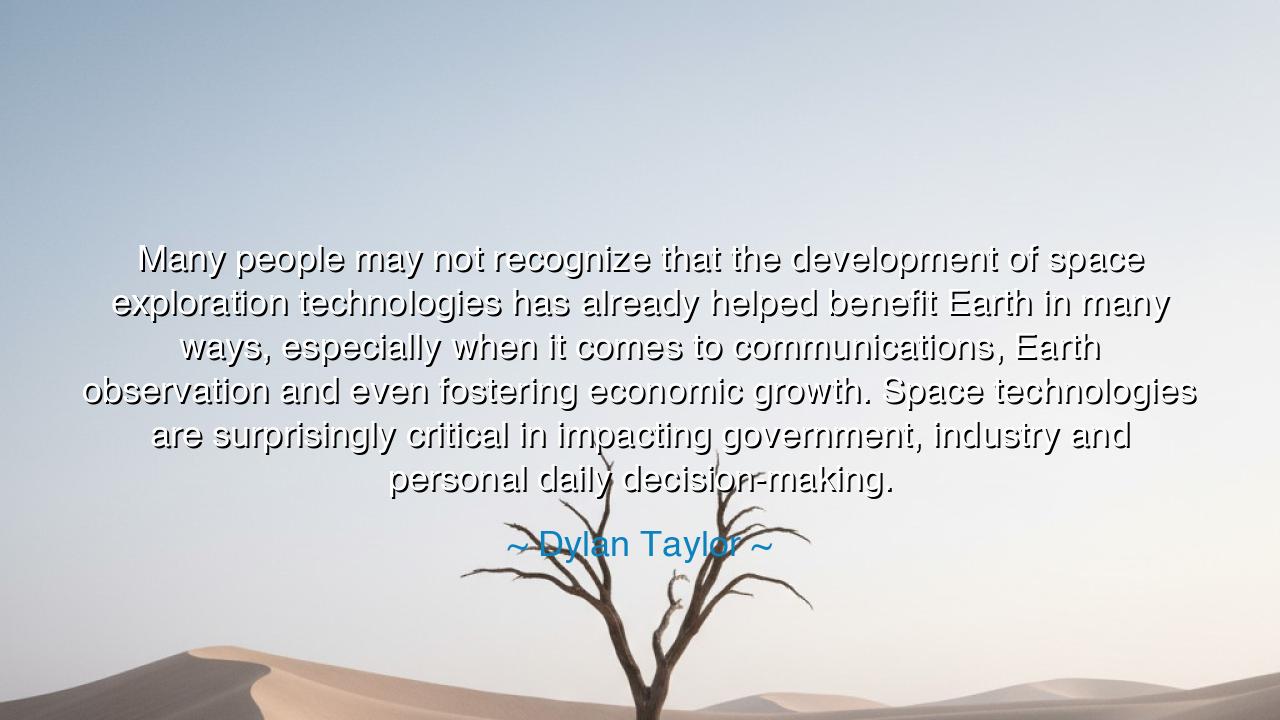
Many people may not recognize that the development of space
Many people may not recognize that the development of space exploration technologies has already helped benefit Earth in many ways, especially when it comes to communications, Earth observation and even fostering economic growth. Space technologies are surprisingly critical in impacting government, industry and personal daily decision-making.






In the age when humanity first learned to look beyond its cradle, the explorer and entrepreneur Dylan Taylor spoke words that remind us of the sacred bond between heaven and Earth:
"Many people may not recognize that the development of space exploration technologies has already helped benefit Earth in many ways, especially when it comes to communications, Earth observation and even fostering economic growth. Space technologies are surprisingly critical in impacting government, industry and personal daily decision-making."
These words, though modern in form, carry the ancient music of vision — the eternal song of mankind’s ascent toward the unknown. Taylor, a pioneer of the new space age, stands among those who see beyond rockets and satellites to the deeper truth: that space exploration is not an escape from Earth, but an extension of it. His message is a reminder that every journey into the stars reflects inward — that in striving to reach the cosmos, we have discovered how to better understand, protect, and sustain the world beneath our feet.
The meaning of his words is both profound and humbling. Many see space as a distant frontier, a realm of science fiction and spectacle — but Taylor reveals that its gifts are already woven into the fabric of our lives. Through satellite communications, we speak across oceans and connect cultures once separated by centuries of distance. Through Earth observation, we track storms, predict droughts, and safeguard crops, harnessing the vantage of orbit to understand the pulse of our planet. And through the rise of space industries, economies have flourished, as new technologies born in laboratories and missions above the atmosphere return home to revolutionize medicine, manufacturing, and mobility. What began as the pursuit of discovery has become the foundation of modern civilization’s intelligence.
The origin of this revelation lies in the mid-twentieth century, when nations raced to touch the stars. In the wake of conflict, humanity turned its gaze upward, seeking both supremacy and enlightenment. The launch of Sputnik in 1957 sparked a global awakening — a new age of science, innovation, and cooperation. From that spark came the satellites that now guide our ships, measure our harvests, and carry the voices of loved ones across the globe. Out of the vastness of the cosmos came not alien wonders, but earthly ones — the technologies of peace, the instruments of understanding. Taylor’s words are the echo of that lineage, a continuation of the vision that began when man first dared to see Earth from above and realized that to know the heavens is also to know home.
Consider the story of Apollo 8, when human eyes beheld for the first time the Earth rising over the lunar horizon — the fragile blue sphere suspended in darkness. That single image, known as Earthrise, transformed our consciousness. It reminded us that our world is small, precious, and interconnected. From that vision came a new reverence for the planet — the birth of the environmental movement, the understanding that what happens in one corner of the globe ripples through the whole. In this way, space exploration did not distance us from our humanity; it deepened it. Taylor’s insight continues this legacy — that our ventures into the cosmos illuminate our responsibilities here below.
In his words also lies a call to humility and unity. For space technologies — those silent sentinels that orbit above — serve not only governments and industries, but every soul that depends upon them unknowingly. When a farmer reads the weather, when a pilot navigates safely, when a family finds its way through the voice of a satellite-guided device, they are all beneficiaries of the stars. Yet few realize it. Taylor reminds us that progress is a shared inheritance, that the tools of exploration belong not to one nation or company, but to the collective endeavor of humankind.
And yet, beyond gratitude, his words urge responsibility. For the heavens, once the realm of gods, are now within our grasp — and with this power comes duty. The technologies that connect us can also divide us; the tools that sustain life can be used to destroy it. Thus, Taylor’s message is not triumph alone, but stewardship. To explore space wisely, we must remember that we are not conquerors of the cosmos, but caretakers of creation. Our machines may travel among the stars, but our hearts must remain bound to the Earth, to justice, and to compassion.
Let this teaching, then, be remembered by all who dream of the future: space is not far away — it is the mirror of Earth’s destiny. Every satellite launched, every mission flown, is a thread in the great tapestry of human progress. Let us honor that gift by using it to uplift, to enlighten, and to unite. Support the sciences, cherish education, and demand that technology serve humanity, not the other way around.
Thus ends the teaching: The sky has never been our limit — only our reflection. Through truth, curiosity, and wisdom, may we continue to reach for the stars not to escape our world, but to better cherish it.






AAdministratorAdministrator
Welcome, honored guests. Please leave a comment, we will respond soon